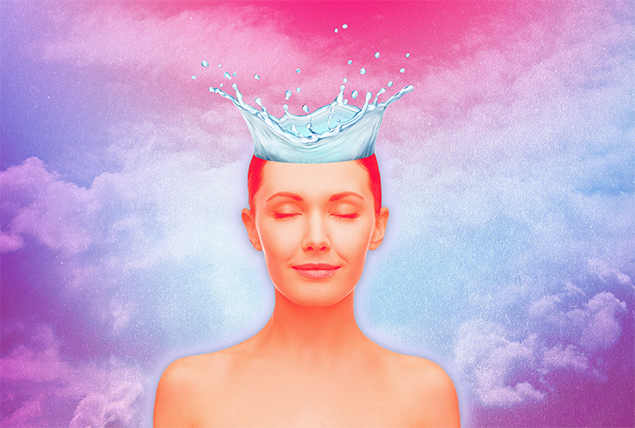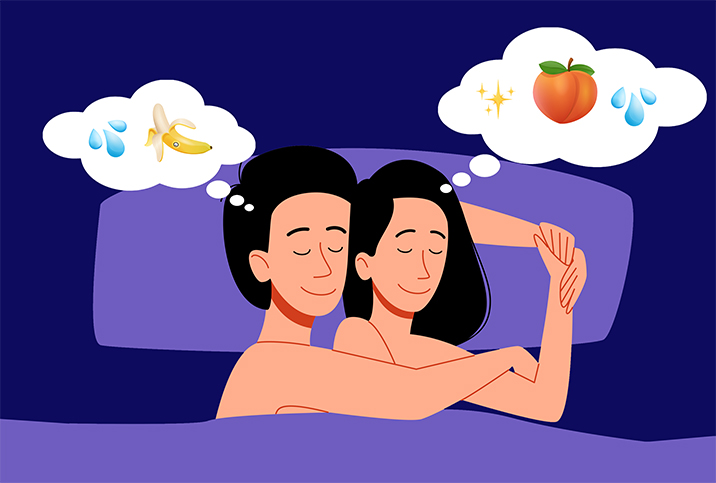Please Stop Believing These Morning Wood Inaccuracies

Waking up with a boner is a familiar sensation for most men. The scientific term for a spontaneous erection while sleeping is nocturnal penile tumescence. It's colloquially referred to as "morning wood."
Across the pond in the United Kingdom, it's often referred to as "morning glory." Back in the 1990s, British rock band Oasis sang "What's the story, morning glory?"
Now it's time to tell that story.
'If you have morning-time erections, that generally is a good sign that your erection physiology is intact.'
Why do guys get morning wood? What causes all this early rising? What does it mean to have a morning erection?
As with many men's health topics, misinformation and misconceptions related to morning wood abound. We spoke with experienced urologists and a clinical psychologist who set the record straight on five common morning wood inaccuracies.
Inaccuracy #1
It's not normal to have morning erections often.
Morning erections occur more frequently in younger men. Some men get morning erections every day. Some get them only occasionally. Some get them rarely. It's all normal and generally no reason for concern.
Sometimes, patients tell Seth Cohen, M.D., they never get morning erections and will ask if that's bad.
"I think it all depends on what's going on in life," said Cohen, an assistant professor of urology and the director of sexual medicine at NYU Langone Health in New York. "Are you working really hard and [are you] really stressed? Not sleeping well? Using a lot of stimulants during the day and sleeping pills at night? These things will all affect the hormonal balance and that circadian rhythm and affect morning erections."
Psychological factors such as severe depression and anxiety, and physical issues such as diabetes and cardiovascular disease may also affect morning erections.
"The obvious stuff that causes ED [erectile dysfunction] in general will also affect morning erectile function," Cohen said.
Inaccuracy #2
Morning erections are the result of erotic dreams.
Nighttime and morning erections do not have anything to do with dreaming, according to Britney Blair, Psy.D., a clinical psychologist and behavioral sleep medicine specialist with The Clinic in San Francisco. They do primarily occur during rapid eye movement (REM) sleep, which is when dreaming mostly occurs, but not because of a dream.
"Guys get and lose erections across the night, lots and lots of times," Blair said. "It's just, oftentimes, most of our REM sleep happens in the morning, and so people will wake up and notice that."
Arthur L. Burnett, M.D., a professor of urology at Johns Hopkins School of Medicine in Baltimore, echoed Blair's sentiment that morning erections are not necessarily related to erotic dreams.
"When you have rapid eye movement sleep, it's correlated with a neuro disinhibition, whereby nerves can fire in a descending way down the spinal cord and stimulate erection responses," he said.
The finer details regarding the neural circuits and brain chemicals released are not well understood, Burnett said.
"It's understood that there are neurocircuits that can fire toward the pelvic region, and they're disinhibited when you have rapid eye movement sleep, meaning that when you're awake, you create an inhibitory pattern of nerve activity that doesn't let these erections actually occur," he said. "With rapid eye movement sleep, there's a disinhibition."
Inaccuracy #3
Morning erections are not a consideration when being assessed for ED.
When assessing ED, or the inability to achieve an erection adequate for sexual activity, a healthcare provider may ask the patient if he wakes up with erections.
"If the answer is 'Yes,' then the cause of the erectile dysfunction is often psychogenic in nature," Blair said.
Psychogenic means the ED has a mental origin rather than a physical one. Common causes of psychogenic ED include performance anxiety, depression, stress, low self-esteem, guilt and partner-related difficulties.
"When guys are no longer waking up with an erection ever, that's when we're more concerned about cardiovascular problems or other underlying physiological problems," Blair said.
For some men with severe ED, one of the first signs will be that they are no longer waking up with erections, Cohen said.
"I don't do anything different for failed morning erections versus other types of ED," he said. "I just treat it all the same. These people just want to have sex, so we try to get them to have sex again with whatever medication they need."
Inaccuracy #4
Morning erections are associated with wet dreams.
Nocturnal emissions, known informally as wet dreams, are when a male ejaculates in his sleep. Wet dreams, which are more common in teens and younger men, are normal and no cause for worry.
Wet dreams and nighttime and morning erections are not necessarily associated, however, according to Burnett.
"There's a different physiology that has to do with the release of nocturnal emission," he said. "Does it have to occur in the presence of a firm penis? No."
It's not uncommon for men to ejaculate in their sleep without an erection, Blair said, because men can have an erection without being mentally aroused at all.
A man can have a wet dream with or without an erotic dream. A man may even become aroused due to sexual stimulation from friction with the bedding.
Inaccuracy #5
While sleeping, men only get erections when they're about to wake up.
It's very common to have multiple erections throughout the night. It varies, but men typically get three to six erections per eight hours of sleep.
"Teenagers are getting erections that can last anywhere from a few minutes to 45 minutes in the middle of the night, multiple times a night," Blair said. "As you age, that decreases both in duration and frequency."
A nocturnal penile tumescence (NPT) test checks to see if a man is having erections during sleep. The test can determine the number of erections, how long they last and how rigid they are. However, tests like NPT and the penile plethysmograph have largely fallen out of favor because they don't change the provider's management of ED, according to Cohen.
Bottom line: Morning erections are a good thing.
"If you have morning-time erections, that generally is a good sign that your erection physiology is intact," Burnett said. "The opposite is not necessarily true. The absence of morning-time erections does not always mean you have erectile dysfunction."


















